MercoPress. South Atlantic News Agency
Tag: World Bank
-
Wednesday, April 10th 2019 - 09:58 UTC
“My trade wars aren't finished yet”, Trump warns IMF and World Bank spring meetings

United States president Donald Trump is sending a clear message to the economic policymakers gathering in Washington for the IMF and World Bank's spring meetings: My trade wars aren't finished yet and a weakening global economy will just have to deal with it.
-
Wednesday, April 10th 2019 - 08:53 UTC
New president says World Bank urgent challenges are addressing poverty and climate change

Newly-installed World Bank President David Malpass spent his first day at the global lender on Tuesday hammering home the message that the most urgent issue facing the bank is addressing global poverty. President Donald Trump's controversial pick to lead the bank appeared eager to distance himself from his past attacks on the institution and stressed the support he has received from developing nations and from staff.
-
Tuesday, April 9th 2019 - 07:10 UTC
Record money transfers to developing countries in 2018, but transfer costs too high claims World Bank
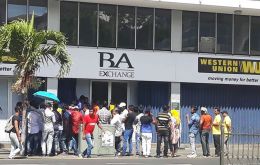
Money transfers to poor and developing countries hit a fresh record in 2018 and should become their largest source of external financing this year, the World Bank said on Monday. But many banks and money transfer operators charged too much, cutting into the gains of migration, the bank said in a statement.
-
Friday, April 5th 2019 - 17:45 UTC
US Treasury official David Malpass elected as World Bank’s president
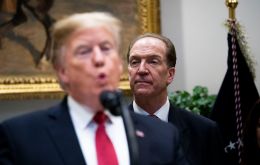
David Malpass has been chosen as the president of the World Bank Group (WBG) on Friday after being unanimously elected by the executive board of the organization with no other candidates.
-
Tuesday, February 5th 2019 - 09:35 UTC
Trump's pick for the World Bank, a skeptic of multilateral institutions
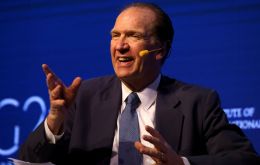
The Trump administration has notified World Bank shareholders that President Donald Trump intends to pick senior Treasury Department official David Malpass as the U.S. nominee to lead the development lender, people familiar with the decision said on Monday.
-
Thursday, January 10th 2019 - 08:28 UTC
World Bank lowers Brazil tepid growth estimates both in 2018 and 2019
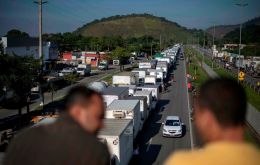
The World Bank lowered its growth estimates for Brazil both in 2018 and this year. Last June the multilateral organization bi-annual report indicated that Latin America's largest economy would advance 2.4%, but it has now reduced that to 1.2%, one of the greatest falls for any country in the report.
-
Wednesday, January 9th 2019 - 08:40 UTC
World Bank says global economy is “soft landing”, so far “orderly”

The World Bank is warning of increasing risks, or what it calls “darkening skies”, for the world economy. In its annual assessment of global prospects the Bank predicts continued, though somewhat slower, growth this year and next.
-
Tuesday, January 8th 2019 - 08:37 UTC
World Bank President steps down; possible differences with Trump's policies

World Bank President, Jim Yong Kim has made the surprise announcement that he is stepping down after six years in the post. His resignation will take effect from 1 February. Mr Kim, 59, was not due to leave until 2022, after he was re-elected for a second five-year term in 2017.
-
Friday, December 7th 2018 - 09:45 UTC
Two more million Brazilians living in poverty: total reaches 54.8 million
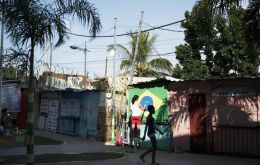
The number of people living in poverty in Brazil grew by two million last year in the wake of the country's worst recession on record, according to the government statistics bureau.
-
Tuesday, December 4th 2018 - 08:58 UTC
“Collapse of civilization on the horizon” because of climate change declared Sir David Attenborough
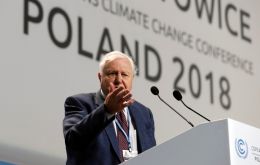
The collapse of civilization and extinction of much of the natural world is “on the horizon” due to climate change, Sir David Attenborough declared at the opening day UN climate talks in Poland.
